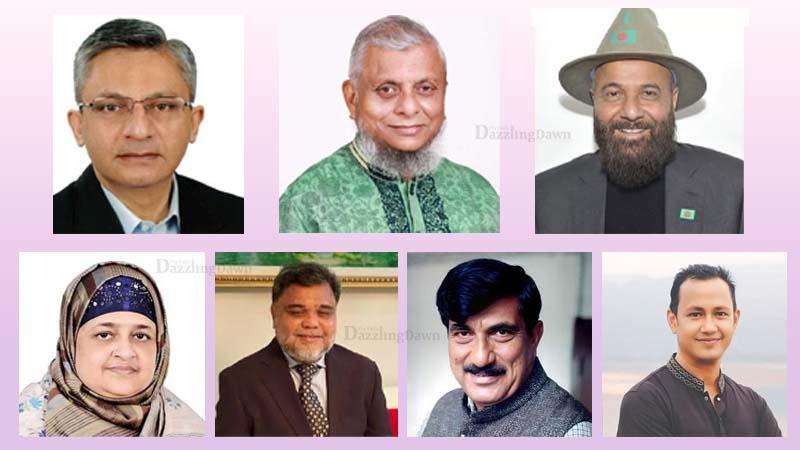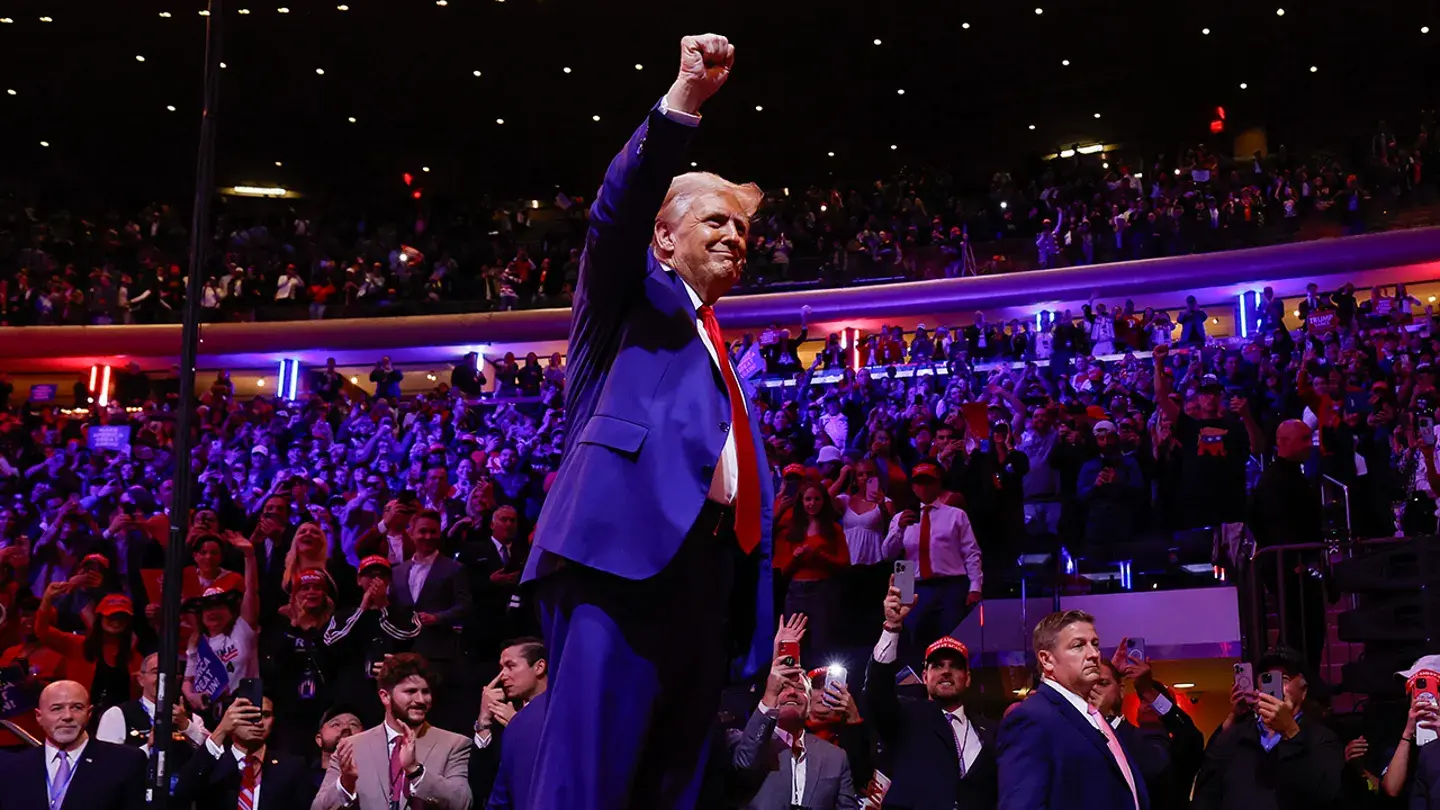Economists, business leaders and policy markers of Bangladesh have expressed diverse reactions to Trump's return to US presidency as most of them have sounded positive note that the Bangladesh-US economic relations will flourish in the coming years as new US President Donald Trump in his election campaign promised to stop the war in Ukraine.
In Bangladesh, people and pundits have special interests in evolving USA policy as the world superpower had different involvement with this country in important historic events, particularly in 1971, 1974, 1975, 1982 and 2007.
The cold war between the USA and the then Soviet Union prompted the Washington DC to support Pakistan and stood against Bangladesh (then East Pakistan) in the liberation in 1971.
Again in 1974, the US government held back its food aid, given under PL-480,on the pretext that Bangladesh started trade relations with Cuba, a blacklisted country. At that time, Bangladesh had a contract with Cuba to export jute – the most important item in the country's export list.
In a chilling warning, the then Obama administration in June 2013, suspended trade privileges for Bangladesh after a six-year review exposed “serious shortcomings” in safety and labour standards.
The decision brought tariffs back on some of Bangladesh's exports to US markets under the programme known as the Generalised System of Preferences. However, the scheme does not apply to Bangladesh's main export: garment.
The suspension underlines the lack of progress by the government in improving factory conditions.
“I have determined that it is appropriate to suspend Bangladesh's designation as a beneficiary developing country under the GSP programme because it is not taking steps to afford internationally recognised worker rights," the then US President Barack Obama said in a message to the Congress in 2013
The US government “has not seen sufficient progress” toward basic safety standards, despite its “close engagement and clear, repeated expressions of concern” with the Bangladesh government over the past few years, US Trade Representative Michael Froman said in a statement.
“The recent tragedies ( The Rana Plaza tragedy in April 2013 that claimed 110 lives of RMG workers, Tazreen garment fire that claimed 112 RMG workers and the killing of labour leader Aminul Islam) that needlessly took the lives of over 1,200 Bangladeshi garment factory workers have served to highlight some of the serious shortcomings in worker rights and workplace safety standards in Bangladesh.”
The Obama administration plans to initiate new discussions with the Bangladesh government on steps to improve the working environment so that GSP benefits can be restored and tragedies like the Rana Plaza collapse and Tazreen fire can be prevented, Froman said. "There is no particular timetable in mind."
Meanwhile, Foreign Adviser Md Touhid Hossain on Thursday expressed confidence that there would not be a significant shift in the United States policy towards Bangladesh under Donald Trump's administration compared to the current Biden's government.
"There is no need to speculate. We will wait and engage as necessary," he told reporters at his office here this afternoon.
The adviser made the remarks when asked about Donald Trump's victory in the US presidential election and its potential implications for Bangladesh-US relations.
Touhid underscored that Bangladesh-US ties are not determined solely by the political party in power in Washington.
"The issues we have been discussing with the Biden administration were essentially a continuation from the previous Trump administration," he said, indicating a likely stability in bilateral relations.
"He (Trump) has not mentioned any significant changes-either positive or negative-in relations with Bangladesh ... did he (Trump) indicate that Washington's relations with Dhaka would be downgraded?" the adviser questioned
The foreign adviser's comments came shortly after his return from Kuwait City, where he attended a UN counter-terrorism conference.
During the conference, Touhid reaffirmed Bangladesh's unwavering commitment to a zero-tolerance policy towards all forms of terrorism.
“The USA policy on Bangladesh will remain at previous level and the Dhaka- Washington economic relations will remain unscathed in the new perspective under Donald Trump era, said president of the American Chamber of Commerce in Bangladesh (AmCham) Syed Ershad Ahmed while giving reactions to the landslide victor of Donald Trump in the November 5, President election.
The new US President will work out on reviving local economy cutting tax, but will impose tax on imported goods. The USAID network is likely to be narrowed, which means developing countries will get less economic and budgetary support.
Syed Ershad Ahmed, also Chairperson and Founder Managing Director of Expeditors (Bangladesh) Ltd, said that Bangladesh will have to increase negotiating skills to increase trade with the world's number one economy. Bangladesh will have to put emphasis on USTR United States Trade Representative and University Technology Development Fund( UTDF)
He also said that the new USA President may cut the budget on climate change that is likely to hurt the developing countries including Bangladesh. The new USA president has promised to stop the war budget that will help boost trade and investment .
Former vice president of Amcham and Country Manager of Mastercard Syed Mohammad Kamal said that as USA has opened a commercial office in Dhaka, USA-Bangladesh trade will increase in the coming days.
Apparel exporters believe the US trade policy towards China – one of Bangladesh's main competitors in the global apparel market – will be pivotal for their industry in the coming years. Since the US is the largest single export destination for Bangladeshi apparel, this policy shift is particularly significant for Bangladesh, the world's second-largest apparel producer after China.
RMG exporters say Republican Trump's plan to impose higher tariffs on imports from China could boost Bangladesh's garment exports.
Trump, widely known for his business-friendly approach, has also expressed a reluctance to engage in international conflicts, which could lead to greater global stability and a favourable business environment.
Economists and businesses, speaking to The Business Standard, have expressed their hope that under his administration, US military involvement in global conflicts may decrease, potentially fostering global stability after several years of disruptions due to various conflicts, which may create a business-friendly environment across the globe.
Envoy Textiles founder Kutubuddin Ahmed said, "The US President-elect Donald Trump is largely known as a business-friendly person, but his stricter stance on China may prompt buyers to shift orders from China to other countries. As the second-largest apparel exporter, Bangladesh could seize this opportunity. During Trump's previous tenure, some RMG orders had already started shifting to Bangladesh."
Kutubuddin noted that Trump has previously avoided military conflicts despite various pressures.
DBL Group Managing Director MA Jabbar echoed the view, but said, "We have to see to our communication with the US government."
He added, "The interim government should focus on improving bilateral trade. It depends on the capacity of our negotiations."
Kutubuddin also said Trump seems to be harsher than others but he is very focused on business, rather than involving any military conflict.
"We observed that the US people consider the right person as their leader to lead the nation, considering all aspects and people are very confident about him. Hopefully, he will play his role very smartly," said Jabbar, who is currently staying in the USA.
Policy Exchange Bangladesh Chairman M Masrur Reaz said Trump's victory paves in both opportunities and risks for countries like Bangladesh.
"For Bangladesh, opportunities lie more in the short to medium term, as Trump's stance on imports from China could lead to increased demand for Bangladeshi goods," he explained. "If Trump imposes high tariffs on Chinese imports, US importers may seek alternative sources, with Bangladesh offering a competitive advantage, particularly in the RMG sector."
Reaz highlighted another opportunity: an influx of foreign direct investment (FDI) from Chinese manufacturers seeking alternative production bases to avoid US tariffs on Chinese goods.
"And that would mean that they would like to set up manufacturing facilities in proven manufacturing hubs such as Bangladesh in order to produce and export from there under the label of those countries," he said.
"So, if Bangladesh can rightly target and strategise, it can bring in a good amount of Chinese FDI in the RMG sector, but also in some other alternative promising sectors such as light manufacturing, machinery, agro-processing, plastics such as toys. In the long run, however, there is a risk because Donald Trump, his position towards globalisation, which is the main driver of global value chain and global trade, is also very negative.
"So, if he rolls out very concrete measures which are against globalisation or defeats the globalisation spirit, it will ultimately hurt everybody. All global partners who now benefit from trade and global trade might even go down, which will ultimately hurt all the countries and global value chain participants such as Bangladesh, Vietnam and so on."
However, Research and Policy Integration for Development Chairman Mohammad Abdur Razzaque said, "President Trump's policies could offer a blend of opportunities and challenges for Bangladesh. His more stringent stance on China could lead to a diversion of export orders from China to other suppliers, potentially benefiting countries like Bangladesh. Furthermore, Trump's intent to reduce US engagement in military conflicts may contribute positively to global stability."
An escalation into a full-scale trade war between the US and China would likely inflict damage on the global economy, Razzaque said. During Trump's previous term, his administration's trade policies contributed to a slowdown in global trade, with Bangladesh witnessing five months of negative export growth from July 2019 to January 2020, he added.
Razzaque further said, "Renewed protectionist measures by the Trump administration could signal a broader resurgence of restrictive trade policies worldwide posing significant implications for countries like Bangladesh. This challenge coincides with Bangladesh's upcoming graduation from Least Developed Country status, potentially intensifying competitive pressures on its exports."
Overall, these dynamics present a complex landscape of both opportunities and potential setbacks for Bangladesh, he added.
The country's net foreign direct investment (FDI) inflow fell by 8.8% in FY24 compared to the previous fiscal year due to difficulties in repatriating earnings, a volatile foreign exchange situation, and other economic uncertainties, according to the Bangladesh Bank.
The latest central bank data published yesterday states that net FDI inflow dropped from $1.61 billion in FY23 to $1.47 billion in FY24, a decline of $142 million year-on-year.
Moreover, outstanding FDI from the USA dropped by $2.92 billion in the last six months.
Naser Ezaz Bijoy, CEO of Standard Chartered Bank Bangladesh, attributed the decline in FDI to three primary factors.
"Firstly, the election year impact – election years tend to witness a slowdown in FDI inflows and the 2024 general election in Bangladesh has likely contributed to this trend.
"Secondly, the economic volatility – while the dollar crisis has somewhat eased, lingering economic instability, including currency devaluation, leading investors to adopt 'wait and see' approach," he said.
"Finally, the downgrading of the country's credit rating: deteriorating credit ratings from international agencies have negatively impacted Bangladesh's investment appetite, as it had an adverse impact on the risk adjusted return on investments, making it less attractive to foreign investors," he added.
Economists warn that Bangladesh's recent credit rating downgrades could further affect FDI. S&P Global Ratings in July 2024 revised Bangladesh's outlook from stable to negative, citing weakened liquidity and potential policy risks tied to domestic political conditions.
Moody's Investors Service also downgraded Bangladesh's rating from Ba3 to B1 in May this year for the first time, though it maintained a stable long-term outlook, indicating no immediate risk to the economy's creditworthiness.
The slowdown in FDI has also impacted the dollar exchange rate over the past year. According to the central bank, the dollar exchange rate reached Tk121 in June, up from Tk108.40 in July 2023, marking a 10.7% increase.
When asked if downgrades from international agencies hinder investments, Dr Mustafa K Mujeri, chief economist of Bangladesh Bank, told The Business Standard that investors certainly take such ratings into account. "These ratings hold special significance in the global market," he said, adding, "They reflect the relative strength of the economy. A poor rating negatively impacts investment."
According to Bangladesh Bank data, $615 million of FY24's net FDI comprised reinvested earnings. The data also states that 42% of net FDI in the first nine months of FY24 came from reinvested earnings, meaning a significant portion of the country's FDI inflow originated from returns on existing foreign investments being reinvested in the country.
In response to why reinvested earnings make up a major part of FDI, a senior central bank official explained that the return on investment in Bangladesh is quite attractive, prompting many investors to reinvest their earnings.
However, investors often face challenges in repatriating their earnings, including a dollar shortage, which compels them to reinvest rather than withdraw funds.
In FY24, the highest investment was in the textile and wearing sector, totaling $436 million. The banking sector followed with $230 million in investments, according to the data.
Other sectors, such as pharmaceuticals and chemicals, power, gas and petroleum, and food, also saw substantial investments.
FDI from the USA falls by $2.92 billion
An analysis of central bank data revealed that the FDI stock from the US experienced a steep decline in the first half of 2024, dropping from $3.94 billion in December 2023 to $1.02 billion by June 2024 – a $2.92 billion reduction that accounted for 97% of Bangladesh's overall $3 billion decrease in FDI stock during this period.
Other countries, including the UK, Singapore, and South Korea, also saw declines in FDI stock in Bangladesh over the past six months.
Regarding the decline in FDI stock from the US, Standard Chartered Bank Bangladesh CEO Naser pointed to the sale of Coca-Cola's Bangladesh factory to a Turkish company, which likely moved investor location from US to Turkey.
Additionally, the significant pending payments of major players in the energy sector have hindered their ability to repatriate profits, he said, adding, "However, recent improvements in remittance procedures have reduced retained earnings."
Naser further said Special Envoy of interim government Lutfe Siddiqui and new Bida Chairman Ashik Choudhury will hold a session of State of Investment Climate on 30 October at 6pm. "We expect to receive credible and time bound plans to improve the investment climate in Bangladesh," he said.
President of American Chamber of Commerce Syed Ershad Ahmed while talking to this correspondent said”Currently Bangladesh under transformation stage as such should not expect that Foreign investors come to invest at this moment.
Present government now focus on supporting existing Foreign Investors in all respect that would help to create good image of Bangladesh in overseas markets.
At the same time government needs to focus on establishing governance, accountability and Transparency at financial and administrative sectors including Banks, NBR and other service providers such as Water . energy and power suppling and other facilitating agencies,
Seamless customs clearance process and automation at all ports are must to improve the country's Logistics index which highly matters to fight with our competitor countries
Profit repatriation should be hassle-free for foreign companies operating in Bangladesh.
……….
Meanwhile, new Bangladesh Ambassador to USA Asad Alam Siam, a career diplomat of the 15th BCS, will meticulously work hard with USA stakeholders to protect the interest of the Bangladesh government, sources in Dhaka and Washington DC said .
He is expected to put economic interest of Bangladesh in negotiating with USA policy makers particularly in promoting Bangladesh’s export to USA, bringing in USA investment in Bangladesh , protecting and promoting Bangladesh’s interest in USA and bringing high level USA delegation to Bangladesh, sources said.
Before Joining the Bangladesh mission in the USA, Asad Alam Siam was Permanent Representative of Bangladesh to the United Nations (Vienna) and the Director-General of the United Nations Office at Vienna (UNOV), Ghada Waly.



.jpeg)




.svg)


